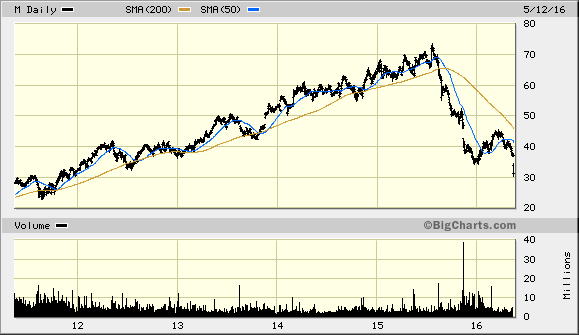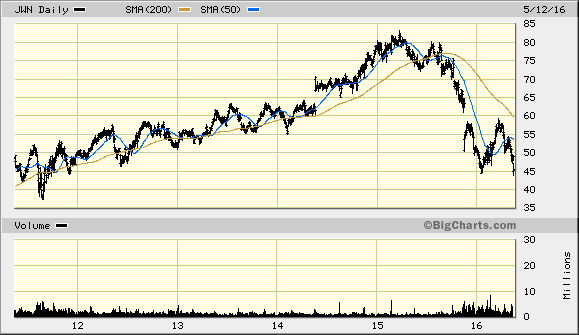Retail Recession
NOTE: Every week or two I wrote a Client Note for my clients. I post most but not all of the notes to my blog but with a time delay usually between 1 day and 1 week. To receive the Client Notes at the same time as my clients, sign up in the box in the right hand corner of the website.
*****
The big retailers are starting to report 1st quarter earnings and the results are not pretty.
It started with Macy’s (M) on Wednesday morning. Macy’s reported a 5.6% decline in same store sales, its worst since the 2nd quarter of 2009. Macy’s also lowered full year guidance from $3.80 to $3.90 to $3.15 to $3.40. Macy’s stock is now down more than 50% from the middle of 2015.
Continuing the negative news parade was Kohl’s (KSS), which reported a 3.9% decline in same store sales on Thursday morning. Diluted earnings per share of 31 cents were down more than 50% from the 63 cents reported in the year ago period. Kohl’s chart looks similar to Macy’s with shares down more than 50% from early 2015.
Finally, Nordstrom (JWN) reported an ugly quarter after the close on Thursday. EPS of 26 cents missed estimates for 46 cents and were down 60% from the 66 cents reported in the year ago period. Nordstrom’s also reduced full year EPS guidance from $3.10 to $3.35 to $2.50 to $2.70. Nordstrom’s stock chart shows the same pattern peaking in early 2015 and now down more than 50% from those levels.
I bring these earnings reports to your attention for a couple of reasons. First, these kinds of stock charts support my belief that we are in a stealth bear market that began in 2015. While some stocks make new highs, like Facebook (FB) and Amazon (AMZN), the market’s leadership is increasingly thinning out.
Second, I want to reiterate my point that the Federal Reserve’s policies are enormously regressive. That is, they help those who own financial assets such as stocks and real estate while doing nothing to stimulate the real economy and those in the middle and lower classes who depend on earning income from their work. These policies are creating increasing inequality with the wealthy, on the one hand, and those who serve them through low paying service jobs, on the other. No wonder Macys, Kohls and Nordstroms are suffering. Their core market, especially for the former two, is the shrinking middle class. (In addition, Amazon continues to take share from brick and mortar retailers).
Greg Feirman
Founder & CEO
Top Gun Financial (www.topgunfp.com)
A Registered Investment Advisor
Bay Area, CA
(916) 224-0113



